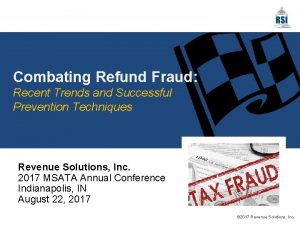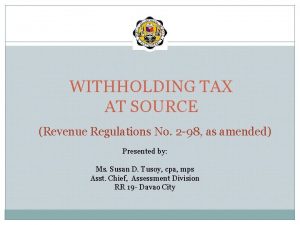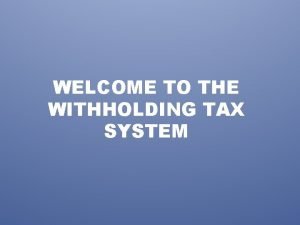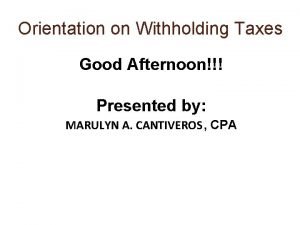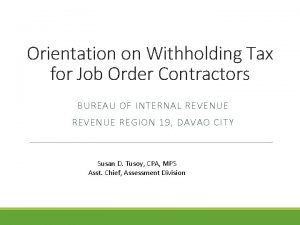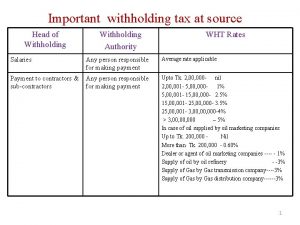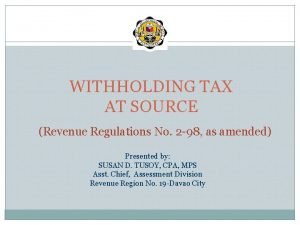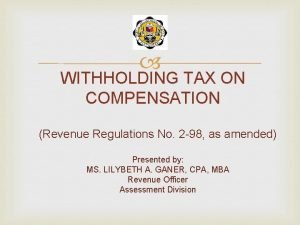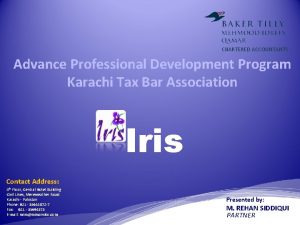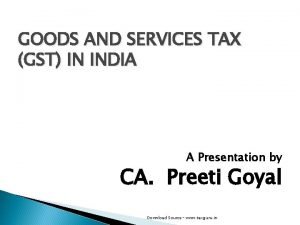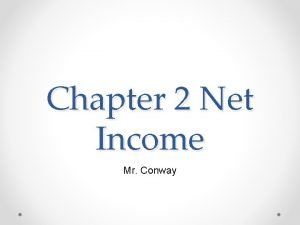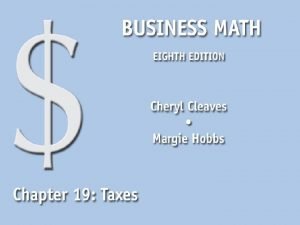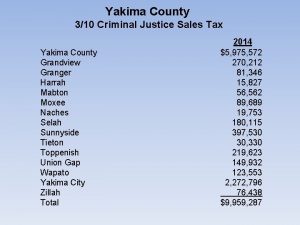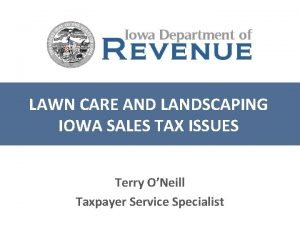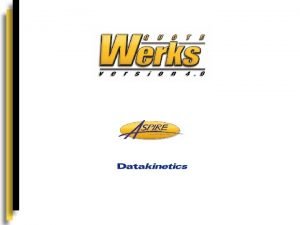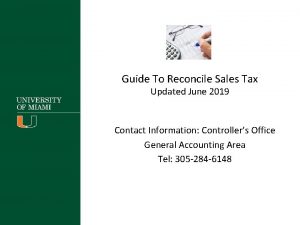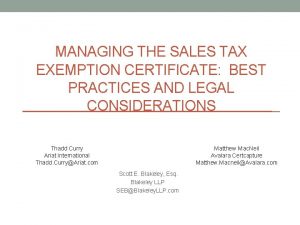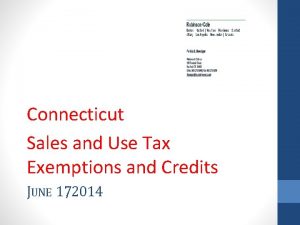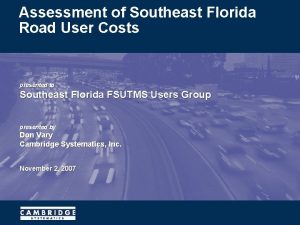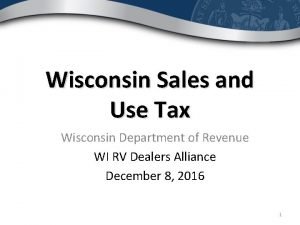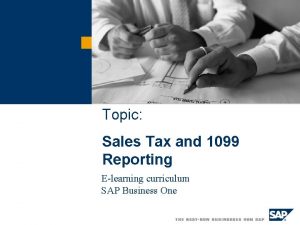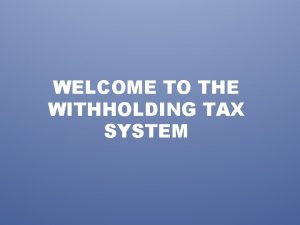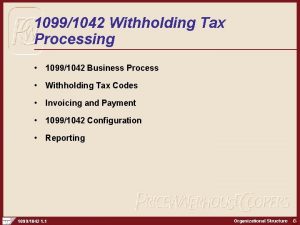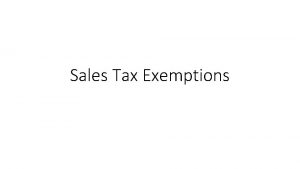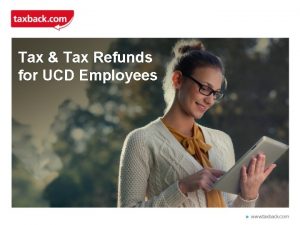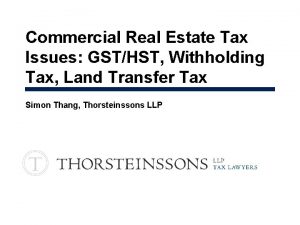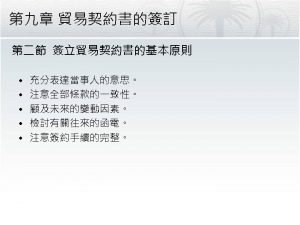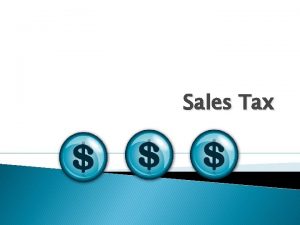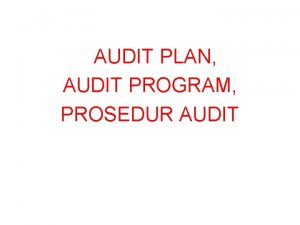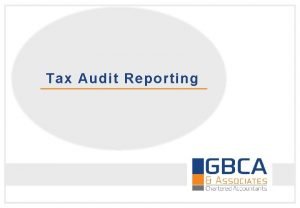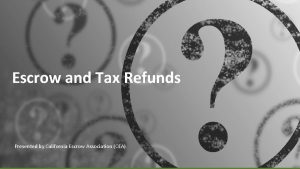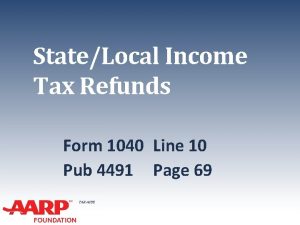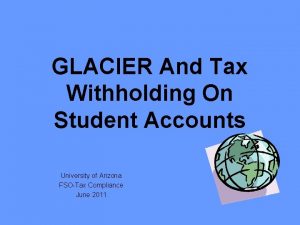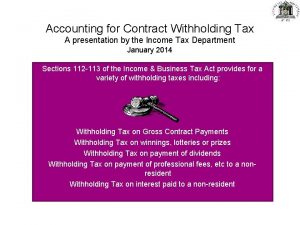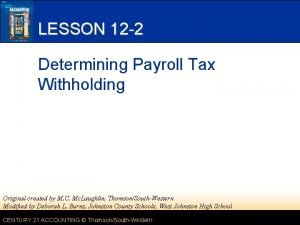Audit Assessment Investigations Refunds Withholding Sales Tax etc















![Refund procedures–ST Rules, 2006 Restriction on the input tax refund [Rule 33] Refund to Refund procedures–ST Rules, 2006 Restriction on the input tax refund [Rule 33] Refund to](https://slidetodoc.com/presentation_image_h2/a62041e7b915c8b6ae990eb42840c500/image-16.jpg)



![Sales Tax Special Procedure (Withholding) Rules, 2007 Withholding Agent [Purchaser] Supplier [whose GST to Sales Tax Special Procedure (Withholding) Rules, 2007 Withholding Agent [Purchaser] Supplier [whose GST to](https://slidetodoc.com/presentation_image_h2/a62041e7b915c8b6ae990eb42840c500/image-20.jpg)

![Punjab Sales on Services (Withholding) Rules, 2015 Withholding Agent [Purchaser] Federal Govt; Provincial Govt; Punjab Sales on Services (Withholding) Rules, 2015 Withholding Agent [Purchaser] Federal Govt; Provincial Govt;](https://slidetodoc.com/presentation_image_h2/a62041e7b915c8b6ae990eb42840c500/image-22.jpg)





- Slides: 27

Audit, Assessment, Investigations, Refunds, Withholding Sales Tax, etc. By: Mazhar Saleem Shah, FCMA 04 November 2015 9/13/2021

Contents of the Presentation § Audit of Sales Tax Records § Assessment & Adjudication § Investigation § Suspension and Blacklisting § Refunds § Withholding of Sales Tax § Offences, Default Surcharge & Penalties © 2010 KPMG International Cooperative (“KPMG International”), a Swiss entity. Member firms of the KPMG network of independent firms are affiliated with KPMG International provides no client services. No member firm has any authority to obligate or bind KPMG International or any other member firm third parties, nor does KPMG International have any such authority to obligate or bind any member firm. All rights reserved. 2

Audit of Sales Tax Records – Types of Audits § Routine audit of records – Section 25 of STA § Pre or Post Refund Audit – Chapter-III of Sales Tax Rules, 2006 § Investigation/Enquiry under Section-38 & 38 B of STA § Audit by Special Audit Panel under Section 32 A of STA § Audit / Investigation by Directorate General of Intelligence and Investigation-IR [refer SRO. 116(I)/2015, dated 9 February 2015]. © 2010 KPMG International Cooperative (“KPMG International”), a Swiss entity. Member firms of the KPMG network of independent firms are affiliated with KPMG International provides no client services. No member firm has any authority to obligate or bind KPMG International or any other member firm third parties, nor does KPMG International have any such authority to obligate or bind any member firm. All rights reserved. 3

Tax Audit – Section 25 of Sales Tax Act, 1990 § CIR or his authorized Tax Officer can requisition statutory records or access the records / computers. § On the basis of records, audit can be conducted once in a year (only once during a financial year except when exceptional circumstances to re-audit prevail). § Records can be re-audited, if audited previously by Auditor General of Pakistan § Order to be passed under Section 11 after completion of audit, as per procedure laid down under Para 39 of STGO No. 3 of 2004, dated 12 June 2004 § Waiver of penalty on voluntary discharge of tax liability during the course of audit and adjudication (100%, 75%, no-waiver) § Section 28 in Sindh ST Act is para-materia to S-25 of STA, however waiver of penalties in voluntary compliances at slightly different rates (100%, 80% & 50%) © 2010 KPMG International Cooperative (“KPMG International”), a Swiss entity. Member firms of the KPMG network of independent firms are affiliated with KPMG International provides no client services. No member firm has any authority to obligate or bind KPMG International or any other member firm third parties, nor does KPMG International have any such authority to obligate or bind any member firm. All rights reserved. 4

What triggers the Sales Tax Audit Basis of Departmental Audit [under Rule 3 of Audit Rules-PRA] § Irregular or abnormal fluctuations in input tax adjustments including carry forwards; § Non or short payments of tax amounts declared on the monthly returns or other declarations; § Unusual variations in inventories; § Habitual tendency of filing short or misfiled returns; § Sudden or unexpected downward changes in turnover; and § Other cogent factor evident from the taxpayer’s computer profile over doubts of tax evasion © 2010 KPMG International Cooperative (“KPMG International”), a Swiss entity. Member firms of the KPMG network of independent firms are affiliated with KPMG International provides no client services. No member firm has any authority to obligate or bind KPMG International or any other member firm third parties, nor does KPMG International have any such authority to obligate or bind any member firm. All rights reserved. 5

Conduct of Sales Tax Audit – STGO No. 3/2004 § Audit Report be the Addl. Commissioner within 14 days § Audit report be forwarded to registered person within 4 weeks, this may be in the form of contravention report or audit observations notice § Audit completion certificate is required to be issued, which is generally avoided by the authorities, yet prescribed under STGO © 2010 KPMG International Cooperative (“KPMG International”), a Swiss entity. Member firms of the KPMG network of independent firms are affiliated with KPMG International provides no client services. No member firm has any authority to obligate or bind KPMG International or any other member firm third parties, nor does KPMG International have any such authority to obligate or bind any member firm. All rights reserved. 6

Audit by Special Audit Panels – Section 32 A § Board can appoint SAP comprising two or more members of IR officers, CA/CMA firms, any designated person by Board (expert in forensic audit) § SAP to be headed by a chairman who shall be an officer of IR. § Absence of any member of SAP may not invalidate the audit proceedings § Scope laid down under Chapter VI of the Sales Tax Rules, 2006 © 2010 KPMG International Cooperative (“KPMG International”), a Swiss entity. Member firms of the KPMG network of independent firms are affiliated with KPMG International provides no client services. No member firm has any authority to obligate or bind KPMG International or any other member firm third parties, nor does KPMG International have any such authority to obligate or bind any member firm. All rights reserved. 7

Assessment of tax – S-11 of STA § Section 36 of STA was omitted vide FA-2012 and merged in S-11. § Four situations are separately dealt u/s 11 of STA viz-a-viz: ü If return is not filed and short-payment is due to any miscalculation. ü Non-payment or short payment of tax or claim of inadmissible refund for reasons other than miscalculation. ü If tax shortfall or claim of inadmissible refund is due to some collusion or deliberate act. ü If tax shortfall or claim of inadmissible is by reason of any inadvertence, error or misconstruction. § It’s difficult for tax officer to distinguish the cases of willful & non-willful evasions § Show cause is mandatory in all above situations, which can be issued within 5 years of relevant date i. e. the time of payment of tax or when the refund was issued. © 2010 KPMG International Cooperative (“KPMG International”), a Swiss entity. Member firms of the KPMG network of independent firms are affiliated with KPMG International provides no client services. No member firm has any authority to obligate or bind KPMG International or any other member firm third parties, nor does KPMG International have any such authority to obligate or bind any member firm. All rights reserved. 8

Assessment of tax – S-11 of STA § Taxpayer must be awarded an opportunity of being heard. § Order-in-Original must be issued within 120 days, extendable by CIR upto 90 days, excluding the time lapsed due to stay proceedings or ADRC or adjournment applied by the taxpayer [not beyond 60 days]. § If taxpayer fails to file a return, the tax officer is empowered to determine the tax liability of the registered person. Procedure for determination of minimum tax liability described under Sales Tax General Order No. 3 of 2004, dated 12 June 2004. § Definition of ‘tax fraud’ describes the cases which tantamount to deliberate evasion of tax. If conditions are not satisfied, the tax officer cannot impose excessive penalties on the registered person. © 2010 KPMG International Cooperative (“KPMG International”), a Swiss entity. Member firms of the KPMG network of independent firms are affiliated with KPMG International provides no client services. No member firm has any authority to obligate or bind KPMG International or any other member firm third parties, nor does KPMG International have any such authority to obligate or bind any member firm. All rights reserved. 9

Key considerations § Audit observation needs to be responded quite seriously to avoid process of adjudication. On the other hand, it helps to reduce the demand prior to issuance of show cause notice. § It is not obligatory upon tax officers to issue audit observation prior to issue of show cause notice. § Show cause notice be examined first on technical grounds like time limitation, jurisdiction, etc. and then on merits. § Imposition of default surcharge and penalties should always be challenged if the tax officer has not proved the malafide intent on the part of taxpayer to evade the tax. § Reply to show cause notice generally emerges as a vital source to build up a strong case before the appellate / litigation forums. © 2010 KPMG International Cooperative (“KPMG International”), a Swiss entity. Member firms of the KPMG network of independent firms are affiliated with KPMG International provides no client services. No member firm has any authority to obligate or bind KPMG International or any other member firm third parties, nor does KPMG International have any such authority to obligate or bind any member firm. All rights reserved. 10

Investigations – S-38 of STA • Section 25 itself provides authority of initiating investigation under Section 38 of STA in cases of tax frauds. • Wide discretion of authorized officer acting on behalf of the Board or Commissioner to access business premises, stocks, records, etc. • Onus lies on FBR / CIR to prove the tax fraud according to definition. • Investigations are generally assigned to DG-I&I offices of FBR. • Section 38 does not provide authority to adjudicate cases, as such assessment/recovery can be enforced through Section 11 of STA. © 2010 KPMG International Cooperative (“KPMG International”), a Swiss entity. Member firms of the KPMG network of independent firms are affiliated with KPMG International provides no client services. No member firm has any authority to obligate or bind KPMG International or any other member firm third parties, nor does KPMG International have any such authority to obligate or bind any member firm. All rights reserved. 11

De-registration, Blacklisting & Suspension • Under S-21 of STA, Board or authorized officer can de-register any RP • In case of issue of fake invoices or tax fraud, CIR can blacklist the RP or suspend the registration in accordance with prescribed procedure • No input tax on invoices during the period of suspension • Once blacklisted, the input tax or refund on invoices issued shall be rejected after adjudication • Refunds can be blocked and investigative audit may be directed • Rule 12 of Sales Tax Rules, 2006 provides detailed procedure on blacklisting and suspension • Non-Active Taxpayer cannot file GDs, issue tax invoices, claim input tax or avail any concession. Other persons directed to avoid purchases from Non-Active Taxpayers. © 2010 KPMG International Cooperative (“KPMG International”), a Swiss entity. Member firms of the KPMG network of independent firms are affiliated with KPMG International provides no client services. No member firm has any authority to obligate or bind KPMG International or any other member firm third parties, nor does KPMG International have any such authority to obligate or bind any member firm. All rights reserved. 12

Refunds 13

Refund - S-10 & S-66 of ST Act Refund Situations Input tax exceeds from output tax on account of zero rate supplies [S-10]; Input tax arise due to export [S-10]; © 2010 KPMG International Cooperative (“KPMG International”), a Swiss entity. Member firms of the KPMG network of independent firms are affiliated with KPMG International provides no client services. No member firm has any authority to obligate or bind KPMG International or any other member firm third parties, nor does KPMG International have any such authority to obligate or bind any member firm. All rights reserved. Unadjuste d Input tax against supplies other than zero rated or export [S-10]; Input tax accumula ted due to restriction provided under Section 8 B [S-10]; Sales tax paid through inadverte nce, error or misconce ption [S-66]; Input tax not claimed within relevant tax period [S-66]

Refund procedures– ST Rules, 2006 § Refund is claimed through monthly sales tax return [Rule-28]; § Refund claim through filing of sales tax return is considered valid only after furnishing of requisite data in the format prescribed in Refund claim Preparation Software [RCPS] alongwith supporting documents [Rule-28]; § RCPS data and supporting documents are required to be furnished within 120 days of the filing of sales tax return [Rule-28]; § On submission of Refund claim, Refund Receipt Section shall ensure completeness of the data and then upload in the system [Rule-29]; § Uploaded information are processed to determine and sanction the amount of refund [Rule-30]. © 2010 KPMG International Cooperative (“KPMG International”), a Swiss entity. Member firms of the KPMG network of independent firms are affiliated with KPMG International provides no client services. No member firm has any authority to obligate or bind KPMG International or any other member firm third parties, nor does KPMG International have any such authority to obligate or bind any member firm. All rights reserved. 15
![Refund proceduresST Rules 2006 Restriction on the input tax refund Rule 33 Refund to Refund procedures–ST Rules, 2006 Restriction on the input tax refund [Rule 33] Refund to](https://slidetodoc.com/presentation_image_h2/a62041e7b915c8b6ae990eb42840c500/image-16.jpg)
Refund procedures–ST Rules, 2006 Restriction on the input tax refund [Rule 33] Refund to the claimant shall be paid to the extent of the input tax paid on purchases or imports that are actually consumed in the manufacture of goods to be exported or supplied at zero percent rate or at reduced rates under five export sector regime. © 2010 KPMG International Cooperative (“KPMG International”), a Swiss entity. Member firms of the KPMG network of independent firms are affiliated with KPMG International provides no client services. No member firm has any authority to obligate or bind KPMG International or any other member firm third parties, nor does KPMG International have any such authority to obligate or bind any member firm. All rights reserved. 16

Refund procedures– Rule 34 of ST Rules, 2006 Time period to claim refund § When Input tax remain unadjusted for a minimum consecutive period of 12 month except in following cases: Ø Any time for following persons: § five sectors mentioned in SRO 1125 dated 31 December 2015, § gas transmission and distribution companies, § manufacturer of fertilizers, § electric power producers and electric power distribution companies Ø When Input tax remain unadjusted for a minimum consecutive period of 3 month in case of Plastic, paper and steel sector; Ø After the end of accounting year or financial year in case input tax not adjusted due to restriction provided in 8 B of ST Act © 2010 KPMG International Cooperative (“KPMG International”), a Swiss entity. Member firms of the KPMG network of independent firms are affiliated with KPMG International provides no client services. No member firm has any authority to obligate or bind KPMG International or any other member firm third parties, nor does KPMG International have any such authority to obligate or bind any member firm. All rights reserved. 17

Sales Tax Withholding

Sales Tax Withholding In Pakistan Under Federal ST , Sindh and Punjab Acts. Sales Tax Withholding in Pakistan Sales Tax Special Procedure (Withholding) Rules, 2007 [Federal WHT] Issued by FBR © 2010 KPMG International Cooperative (“KPMG International”), a Swiss entity. Member firms of the KPMG network of independent firms are affiliated with KPMG International provides no client services. No member firm has any authority to obligate or bind KPMG International or any other member firm third parties, nor does KPMG International have any such authority to obligate or bind any member firm. All rights reserved. Sindh Sales Tax Special Procedure (Withholding) Rules, 2015 [Sindh WHT] Issued by SRB Punjab Sales Tax on Services (Withholding) Rules, 2015 [Punjab WHT] Issued by PRA
![Sales Tax Special Procedure Withholding Rules 2007 Withholding Agent Purchaser Supplier whose GST to Sales Tax Special Procedure (Withholding) Rules, 2007 Withholding Agent [Purchaser] Supplier [whose GST to](https://slidetodoc.com/presentation_image_h2/a62041e7b915c8b6ae990eb42840c500/image-20.jpg)
Sales Tax Special Procedure (Withholding) Rules, 2007 Withholding Agent [Purchaser] Supplier [whose GST to be withheld] Federal Govt; Provincial Govt; Autonomous body Public sector organization Registered Person Registered status of Supplier Rate of GST Withholding Wholesaler, dealer or distributor 1/10 th of Sale Tax Amount Others 1/5 th of Sales Tax Amount N/A 17% or at the applicable rate of sales tax Wholesaler, dealer or distributor 1/10 th of Sale Tax Amount Others 1/5 th of Sales Tax Amount N/A 1% of gross value of supplies Wholesaler, dealer or distributor 1/10 th of Sale Tax Amount Others 1/5 th of Sale Tax Amount N/A 1% of gross value of supplies Unregistered Person Companies as per Income Tax Ordinance, if registered with sales tax, excise or income tax Registered Person Unregistered Persons Registered under sales tax as Exporter Registered Person Unregistered Person Recipient of service of advertisement, who are registered for sales tax Registered Person Unregistered Person N/A Applicable rate of sales tax EXEMPTIONS: Payments to registered persons against acquisition of following goods are exempt from sales tax withholding : Electrical energy Natural gas Petroleum products supplied by petroleum production and exploration companies, oil refineries, oil marketing companies and dealer of motor spirit and high speed diesel Registered persons paying sales tax under Chapter XI of the Sales Tax Special Procedure Rules, 2007, except those paying sales tax on ad valorem basis at standard rate. Vegetable ghee and cooking oil Telecommunication services Goods falling under the Third Schedule to the Sales Tax Act, 1990 Goods supplied by commercial importers on which Value Addition Tax has been paid at import stage © 2010 KPMG International Cooperative (“KPMG International”), a Swiss entity. Member firms of the KPMG network of independent firms are affiliated with KPMG International provides no client services. No member firm has any authority to obligate or bind KPMG International or any other member firm third parties, nor does KPMG International have any such authority to obligate or bind any member firm. All rights reserved. 20

Sindh Sales Tax Special Procedure (Withholding) Rules, 2015 Withholding Agent if he is resident in Sindh or has a place of business in Sindh - Offices and departments of Federal Government, Provincial Governments, and Local or District Governments; Service provider [whose SST to be withheld] Rate of SST Withholding Registered Person 1/5 th of Sales Tax Amount Unregistered Person Applicable rate of sales tax Registered Person Applicable rate of sales tax except for services of advertising agent Unregistered Person Applicable rate of sales tax N/A Applicable rate of sales tax - Autonomous bodies; - Public sector organizations, including public corporations, state-owned enterprises and regulatory bodies and authorities; - Organizations which are funded, fully or partially, out of the budget grants of the federal or provincial governments; Companies, as defined in clause (28) of section 2 of the Sindh ST Act FBR-registered or SRB-registered persons receiving taxable services of advertisements, renting of immovable property, services of auctioneers, services of inter-city transportation of goods, services of advertising agent. SRB registered person receiving taxable services from unregistered persons EXEMPTIONS: Payment to following, if registered under Sindh Sales Tax on Services Act, 2011, are exempt from Sindh sales tax withholding : Telecommunication service providers Banking companies Financial institutions Insurance company other than reinsurance company Port operators Airport operators Terminal operators Airport ground service providers © 2010 KPMG International Cooperative (“KPMG International”), a Swiss entity. Member firms of the KPMG network of independent firms are affiliated with KPMG International provides no client services. No member firm has any authority to obligate or bind KPMG International or any other member firm third parties, nor does KPMG International have any such authority to obligate or bind any member firm. All rights reserved. 21
![Punjab Sales on Services Withholding Rules 2015 Withholding Agent Purchaser Federal Govt Provincial Govt Punjab Sales on Services (Withholding) Rules, 2015 Withholding Agent [Purchaser] Federal Govt; Provincial Govt;](https://slidetodoc.com/presentation_image_h2/a62041e7b915c8b6ae990eb42840c500/image-22.jpg)
Punjab Sales on Services (Withholding) Rules, 2015 Withholding Agent [Purchaser] Federal Govt; Provincial Govt; Autonomous body Public sector organization etc. Company which is a resident or has a place of business in the Punjab Recipient of advertisement services registered for Federal sales on goods or Punjab sales tax on services Registered persons receiving taxable services from other than registered persons Accounting office responsible for payment against invoices of taxable services received by Government department Service provider [whose sales tax to be withheld] Rate of PST Withholding Registered Person Applicable rate of sales tax Unregistered Person Applicable rate of sales tax N/A Applicable rate of sales tax Registered Person Applicable rate of sales tax Unregistered Person Applicable rate of sales tax EXEMPTIONS: Payments against following services are exempt from Punjab sales tax withholding : Telecommunication Banking Courier Insurance Services (except advertisement services) provided by the companies being the active taxpayer. © 2010 KPMG International Cooperative (“KPMG International”), a Swiss entity. Member firms of the KPMG network of independent firms are affiliated with KPMG International provides no client services. No member firm has any authority to obligate or bind KPMG International or any other member firm third parties, nor does KPMG International have any such authority to obligate or bind any member firm. All rights reserved. 22

KPKRA Sales Tax Special Procedure (Withholding) Rules, 2015 Withholding Agent - Offices and departments of Federal Government, Provincial Governments, and Local or District Governments; - Autonomous bodies; - Public sector organizations, including public corporations, stateowned enterprises and regulatory bodies and authorities; - Organizations, projects which are funded, fully or partially, out of the budget grants of the federal or provincial governments; Companies, as defined in clause (12) of section 2 of KPK Act, which are resident of the Province or have a place of business there. Recipient of Advertisement Services who are registered for FBR's sales tax on goods or for KPK sales tax on services Act. Registered person in KPK receiving taxable services from unregistered persons Service provider [whose sales tax to be withheld] Rate of withholding sales tax Registered Person 1/5 th of Sales Tax Amount Unregistered Person Applicable rate of sales tax Registered Person Applicable rate of sales tax Unregistered Person Applicable rate of sales tax N/A Applicable rate of sales tax Exclusion from Withholding provisions NONE © 2010 KPMG International Cooperative (“KPMG International”), a Swiss entity. Member firms of the KPMG network of independent firms are affiliated with KPMG International provides no client services. No member firm has any authority to obligate or bind KPMG International or any other member firm third parties, nor does KPMG International have any such authority to obligate or bind any member firm. All rights reserved. 23

Offences, Default Surcharge and Penalties 24

Default surcharge under Section 34 § Default Surcharge: Default Surcharge is attracted in case of non payment of tax due within due date whether intentionally or otherwise, as per the following rates: Non payment on account of any reason, other than tax fraud KIBOR plus 3% per annum of the amount of tax due Non payment on account of tax fraud 2% per month (24% per annum) © 2010 KPMG International Cooperative (“KPMG International”), a Swiss entity. Member firms of the KPMG network of independent firms are affiliated with KPMG International provides no client services. No member firm has any authority to obligate or bind KPMG International or any other member firm third parties, nor does KPMG International have any such authority to obligate or bind any member firm. All rights reserved. 25

Penalty under Section 33 § If a person commits offenses prescribed under various provisions of law, then penalties as provided in the Table of Section 33 would be enforced. § Penalties are waived on voluntary compliance by registered persons as provided under Section 25 of STA. However, default surcharge is payable on every late payment of tax due. § Superior courts have held in plethora of decisions that penal provisions of any tax statute become applicable whenever the element of mens-rea exists in relation to evasion of tax. © 2010 KPMG International Cooperative (“KPMG International”), a Swiss entity. Member firms of the KPMG network of independent firms are affiliated with KPMG International provides no client services. No member firm has any authority to obligate or bind KPMG International or any other member firm third parties, nor does KPMG International have any such authority to obligate or bind any member firm. All rights reserved. 26

JAZAKALLAH KHAIR © 2010 KPMG International Cooperative (“KPMG International”), a Swiss entity. Member firms of the KPMG network of independent firms are affiliated with KPMG International provides no client services. No member firm has any authority to obligate or bind KPMG International or any other member firm third parties, nor does KPMG International have any such authority to obligate or bind any member firm. All rights reserved. 27
 Irs tax refunds
Irs tax refunds Expanded withholding tax computation
Expanded withholding tax computation Expanded withholding tax computation
Expanded withholding tax computation 2306 bir form
2306 bir form Bir form 1901 job order
Bir form 1901 job order Withholding tax for commission
Withholding tax for commission Expanded withholding tax revenue regulation
Expanded withholding tax revenue regulation Bir 2316 cd
Bir 2316 cd Wh1612
Wh1612 Withholding reinforcement for a target response
Withholding reinforcement for a target response 165 withholding statement excel file
165 withholding statement excel file Conclusion on gst
Conclusion on gst Roland purcell a technical writer
Roland purcell a technical writer How to figure out sales tax from total
How to figure out sales tax from total How to find sales tax
How to find sales tax Yakima county department of assigned counsel
Yakima county department of assigned counsel Sales tax on landscaping
Sales tax on landscaping Quotewerks sales tax report
Quotewerks sales tax report Workday sales tax
Workday sales tax City of louisville sales tax
City of louisville sales tax Javascript sales tax script
Javascript sales tax script Scentsy sales tax
Scentsy sales tax Managing sales tax exemption certificates
Managing sales tax exemption certificates Infor xa sales tax report
Infor xa sales tax report Connecticut sales tax exemptions
Connecticut sales tax exemptions Ttvs quotes
Ttvs quotes Wisconsin sales tax license
Wisconsin sales tax license Sap 1099 reporting
Sap 1099 reporting
